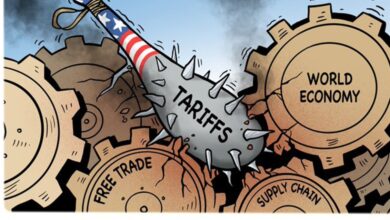China Imposed Penalty On European Brandy !
Trade Tension Rise as China Takes Anti-Dumping Measures on EU Brandy Imports

China issued temporary anti-dumping measures on brandy imports from the European Union amid the rising trade tensions between China and the European Union, a move that has shocked the global spirits industry. This decision, targeting mainly high-profile brands from France, was taken at the time when the EU just made a decision to apply tariffs on China-made electric vehicles (EVs). It marks a sharp increase in the already reiterated trade war between the two economic giants.
On Oct. 10, 2024, China’s Ministry of Commerce stated that they had decided to impose security deposits of between 34.8% and 39.0% of the import value on brandy imports from the EU starting from October 11. China took this step based on a preliminary investigation which found the dumping of brandy imported from the EU, the culprit of causing serious damage to China’s domestic brandy sector.
The impact would be exceptionally detrimental to the French brandy producers whose market share in brandy imports in China was an astonishing 99% over the last year alone. The total brandy exports of France to China was – $1.7 billion, thus representing a good market for such manufacturers. The major loss would, however, be among the brands including Hennessy and Remy Martin, whose importers are asked to make security deposits of 39.0% and 38.1%, respectively.
Not to be left behind are other prominent brands. Martell, although at the lowest rate of the mentioned brands, still bears a very high 30.6% security deposit requirement. Companies that collaborated with China on their investigation received slightly lower security deposit rates of 34.8%.
 The immediate effect will be a sharp rise in the amount of dollars that an importer needs to pay to import brandy from the EU to China. How soon an importer could recover these deposits is not yet clear and even the commerce ministry of the Chinese government hasn’t offered any answers on this. Again, this increases the complications for the importers and distributors.
The immediate effect will be a sharp rise in the amount of dollars that an importer needs to pay to import brandy from the EU to China. How soon an importer could recover these deposits is not yet clear and even the commerce ministry of the Chinese government hasn’t offered any answers on this. Again, this increases the complications for the importers and distributors.
The shares of the majors spirits fell as soon as the news hit the financial markets.
- Pernod Ricard’s shares saw a decline of 2.9%.
- LVMH, owner of Hennessy, saw its shares sliding down by 4%.
- Remy Cointreau slipped by 5%.
What can we imply from these fall downs?
Probably, these market sentiments tells us the serious fiscal consequences on the respective brandy tycoons and their shareholders with Chinese move.
Escalating Trade Tensions and Retaliatory Measures
The timing and nature of China’s decision strongly paves the way to the fact that this is a retaliatory measure in response to the EU’s recent actions regarding Chinese-made EVs. At the end of August this year, the EU voted to implement tariffs on China-made EVs, and these tariffs were expected to be fully implemented by the end of October. The ruling set an import tariff range, with Tesla being charged 7.8%, while SAIC and other producers without what the EU perceived as cooperation in the anti-subsidy investigation were slapped with 35.3%. These tariffs are in addition to the standard 10% car import duty into the EU.
What’s interesting here is that China had suspended its planned anti-dumping measures targeting brandy from the EU in late August. This appeared to be a gesture of goodwill. While the Chinese commerce ministry, at that time, said its investigation would be completed before January 5, 2025, it did reserve the right to extend the probe. The immediate reversal of this suspension and imposition of measures just days after the EU vote on EV tariffs clearly points out the retaliatory nature of China’s action.
 So, do you think the Paris will not have stern reactions?
So, do you think the Paris will not have stern reactions?
The country’s trade ministry categorised the temporary Chinese acts as “incomprehensible” and a violation of free trade principles. France has said that it will collaborate with the European Commission to protest over this move in the World Trade Organization arena, which means this trade dispute can escalate even more at the international level.
Last week, French President Emmanuel Macron was frank in speaking on the situation- referring to China’s probe into the country’s brandy as “pure retaliation.” However, in his defense regarding the EU’s decision on EV tariffs, the president asserted it was essential to keep a level playing field in the automotive market.
What are the Broader Implications and Possible Future Moves?
China’s move against EU brandy imports may be only the first in a whole series of retaliatory measures. The country’s commerce ministry indicated it would ponder further steps when referring to its anti-dumping and anti-subsidy probe of EU pork products, saying it would make “objective and fair” decisions when it wraps up its process. This is an indication that the pork sector would likely suffer the highest brunt in this burgeoning trade confrontation.
But China has threatened to raise duty on imports of big-engine automobiles. This would be a direct hit for German car makers, as German exports of automobiles with over 2.5 L engines to China stood at $1.2 billion for the preceding year. So far, the move is a clear strategic objective of China targeting key EU industries and member states in its retaliation.
These measures may impact not only the brandy and automotive sectors but, more significantly, are expected to manifest larger effects in the luxury goods sector. For instance, among the players in this industry, fears are rife that it might be the next target of Chinese trade measures. The fears were reflected in the stock market as luxury shares fell up to 7% on the day of announcement of the brandy tariff. The largest market for luxury brands resides in China, so the impact of such measures would be catastrophic for the industry.
Industry Response and Impact On The Economy
 The reaction from the brandy industry has been worried and disappointed. Bureau National Interprofessionnel du Cognac(BNIC), the group of French cognac producers, stated bluntly that China’s decision marks a firm intention to tax the products of the EU as retaliation for European decisions on Chinese electric vehicles. The statement points to the need for industry people to understand their political nature.
The reaction from the brandy industry has been worried and disappointed. Bureau National Interprofessionnel du Cognac(BNIC), the group of French cognac producers, stated bluntly that China’s decision marks a firm intention to tax the products of the EU as retaliation for European decisions on Chinese electric vehicles. The statement points to the need for industry people to understand their political nature.
The economic impact of the measures on the brandy industry could be considerable. Security deposits could lead to up to a 20% price increase for Chinese customers, which might reflect at least a 20% volume decline, said analysts at Jefferies. Most severely affected would, of course, be the businesses that have very big exposures in China. Remy Cointreau might be recording sales down by 6%, for instance and group sales for Pernod Ricard may be adversely affected by 1.6%.
These projections are particularly worrisome because China is the second-largest export market for cognac after the United States and has been considered the most profitable market for the industry. The brady industry was already facing tough economic conditions in both of these key markets, resulting in a sharp slowdown in cognac sales even before the new measures were announced.
Not all industry observers are pessimistic about the long-term prospects, though. For instance, River Global fund manager James Sym said there was nothing that suggests that the demand side for cognac changed. He pointed out that indeed sales of cognac increased recently in Japan at the account of Chinese tourists when the yen was weak as proof that demand for cognac still exists. Sym said that he is confident enough that volumes should rebound, as will the share prices of the companies but said the tariffs are likely to dent volumes and margins during their period of stay.
Active Investigations and Negotiations
It needs to be keep in mind that both the investigation and negotiation between China and the EU are underway. According to the report, an executive from one of the leading cognac companies expressed his concerns over the condition of anonymity because of how sensitive this matter is. Chinese investigators had already visited the producers in France last month and were supposed to make site visits this month as well. Meanwhile, Chinese and EU officials met Monday, October 9, a day before the security deposit requirement announcement.
However, the aftermath of these negotiations cannot be predicted, and this already creates doubt about the willingness of the EU to strike a deal. It adds complexity to the situation and may ensure that tensions over trade between China and the EU will stay high in the near future.
What Will Happen?
The European Commission said it’s open to discuss and find a solution after imposing tariffs. In this respect, dialogue is opened wide, which can give hope that a solution may be found, and thus perhaps after the imposition of these trade barriers, they may be removed or reduced in the future.

The imposition of anti-dumping measures on EU brandy imports by China takes the China-EU trade tensions to a whole new level. The move made by China, which was quite clearly for the sake of retaliation, shows just how interlinked global trade is and just how controversy over a product in one industry can send ripples throughout an economy into several other industries.
Therefore, it is important for us to follow how this situation develops further not only in terms of direct impacts on the brandy industry but also the potential indirect impacts on different sectors, such as the luxury goods and the automobile sector, respectively. The European Union’s response and the ones from the individual member states, specifically France and Germany, shall determine the overall flow of the trade war dispute.
This development, at the same time, reminds all people about the delicate balance of international trade relations as well as the economic consequences of such political decisions. As negotiations carry on and investigations are called for, the business world will be holding its breath in hopes that the resolution will bring back stability and predictability to trade between two of the economic markets.
Whether this level of discord is resolved through diplomacy or if it is going to escalate into a general trade war that will have rather dismal consequences for businesses and consumers on both sides, the coming months will tell. But one thing is already certain: the incident will continue to be an issue of intense interest and concern for policymakers, business leaders, and economists in general in different regions of the globe as the situation unfolds.




